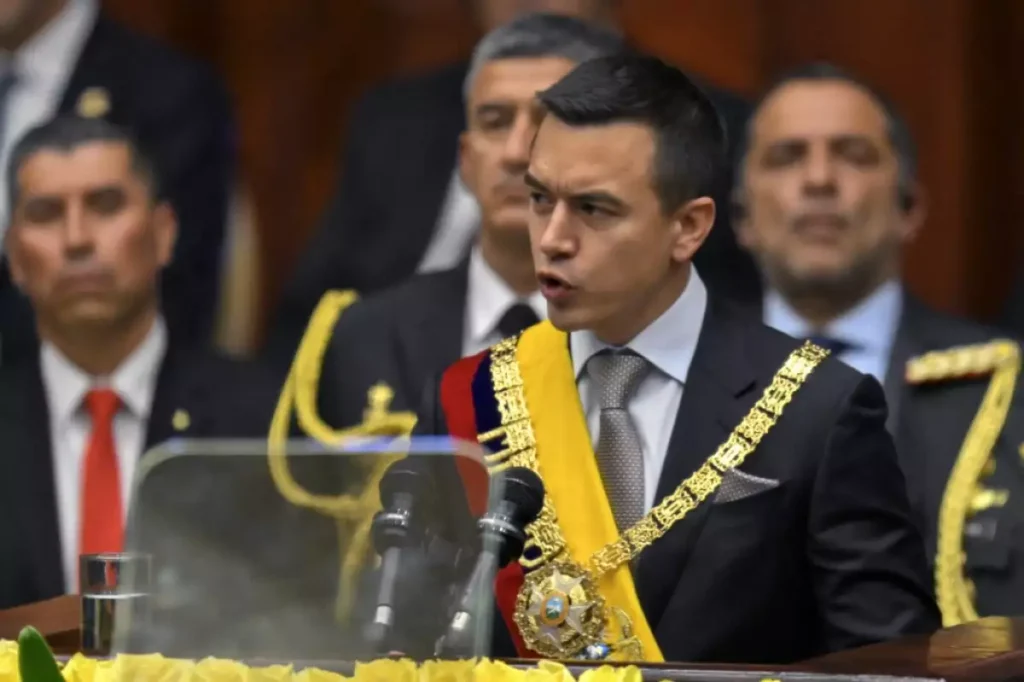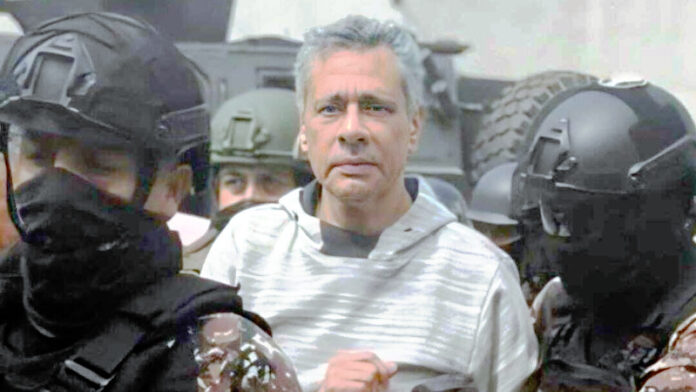The Latest Showdown
The diplomatic world is watching as Mexico takes Ecuador to the International Court of Justice over one of the most brazen violations of diplomatic immunity in recent history. The case centers on Ecuador’s raid of the Mexican embassy in Quito on April 5, 2024, ordered by newly-elected President Daniel Noboa, to arrest Jorge Glas, a former vice president already convicted of corruption charges. The decision by Ecuador’s 36-year-old president to breach diplomatic immunity has sent shockwaves through the international community.
Who is Jorge Glas?
Jorge Glas served as vice president of Ecuador from 2013 to 2017 under Rafael Correa’s administration (Correa himself has been living in Belgium since 2017 to avoid corruption charges). Glas’s legal troubles are extensive:
- In 2017, he was sentenced to 6 years in prison for accepting $13.5 million in bribes from Brazilian construction giant Odebrecht
- In 2020, he received another 8-year sentence for additional bribery charges
- In 2021, courts added another 8-year sentence for misuse of public funds
After serving five years in prison (2017-2022), Glas was released but soon faced new charges related to the misuse of reconstruction funds following Ecuador’s 2016 earthquake. In December 2023, he fled to Mexico’s embassy claiming political persecution.
Police Storm Mexican Embassy in Midnight Raid
The crisis had been brewing since December 2023, when Glas first sought refuge in Mexico’s embassy. For over three months, he remained in diplomatic limbo while Mexico considered his asylum request. Then, on April 3, 2024, Mexican President López Obrador made controversial comments about Ecuador’s political situation and the assassination of presidential candidate Fernando Villavicencio. Ecuador, offended by what they saw as interference in domestic affairs, declared Mexico’s ambassador persona non grata.
Two days later, on April 5, Mexico finally granted Glas asylum. The response was swift and unprecedented: just hours after the asylum announcement, Ecuadorian police scaled the embassy walls under cover of darkness, physically confronted diplomatic staff, and arrested Glas—a shocking violation of diplomatic immunity that has left the international community reeling.
Ecuador’s Stunning Diplomatic Hypocrisy
The irony of Ecuador’s embassy raid is particularly striking given their own recent history with diplomatic asylum. For seven years (2012-2019), Ecuador passionately defended the principle of diplomatic immunity while protecting WikiLeaks founder Julian Assange in their London embassy. Assange, wanted for questioning in Sweden and fearing extradition to the United States over WikiLeaks’ publication of classified documents, had sought refuge in Ecuador’s embassy. For years, British police surrounded the embassy but never dared to enter, respecting the fundamental principle that embassy grounds are inviolable foreign territory.
Ecuador staunchly defended this diplomatic principle throughout Assange’s stay, arguing that embassies are sovereign territory and that host countries cannot violate this sovereignty under any circumstances—even to arrest someone wanted by law enforcement. They maintained this position even under intense international pressure.
Yet now, Ecuador has done exactly what they previously insisted the UK could not do: invade a foreign embassy to arrest someone claiming political asylum. Their justification? They claim Glas is a convicted criminal, not a political refugee, and that they had intelligence about an imminent escape attempt. However, the Vienna Convention on Diplomatic Relations—the same international law Ecuador once relied on to protect Assange—doesn’t include exceptions for criminal suspects, no matter how serious the charges.

The International Response
The reaction was swift:
- Mexico immediately severed diplomatic relations
- Nicaragua broke ties with Ecuador in solidarity
- The U.S. State Department condemned the violation of diplomatic norms
- Numerous Latin American countries expressed support for Mexico
- The Organization of American States called for dialogue
The Legal Battle Ahead
The case is now before the International Court of Justice in The Hague, where Mexico seeks:
- Reparations from Ecuador
- Ecuador’s potential suspension from the UN
- Guarantees for the safety of remaining diplomatic facilities
Ecuador has filed its own complaint, arguing that Mexico abused diplomatic privileges by harboring a convicted criminal. Both sides presented their initial arguments on April 30, 2024.
Why This Matters
This isn’t just another Latin American political drama. It’s a dangerous precedent that threatens the foundation of international diplomacy. The inviolability of diplomatic premises has been a cornerstone of international relations for centuries, allowing countries to maintain dialogue even during conflicts.
If Ecuador faces no serious consequences for this breach, we might see other countries deciding that diplomatic immunity is optional when inconvenient. In today’s tense global environment, that’s a precedent we can’t afford to set.
The case represents more than just justice for Glas or a spat between Mexico and Ecuador. It’s about whether international law still means anything in the 21st century, or if we’re returning to an era where might makes right—even in diplomatic relations.
References
- Associated Press. (2024, April 30). México lleva a Ecuador ante la CIJ por la irrupción en su embajada en Quito. [Mexico takes Ecuador to ICJ over embassy raid in Quito].
- La-Lista. (2024, April 9). La-Lista sobre el conflicto México-Ecuador: qué pasó, países que apoyan a México… [The List about the Mexico-Ecuador conflict: what happened, countries that support Mexico…].
- Secretaría de Relaciones Exteriores. (2024, April 6). México rompe relaciones diplomáticas con Ecuador tras ataque a su embajada. [Mexico breaks diplomatic relations with Ecuador after embassy attack]. Comunicado No. 128.
Note: Original articles were in both Spanish and English. Translations of titles are provided in brackets.
OPINION | ANALYSIS
This article is an opinion piece that represents the author’s views on the diplomatic crisis between Ecuador and Mexico. While based on reported events and official statements, the analysis, interpretations, and conclusions drawn are the author’s own and should not be taken as statements of fact. Some events mentioned are still developing, and official investigations are ongoing. This piece aims to provide context and analysis but should not be considered a definitive account of the situation. For the most current information, readers should consult official sources and latest news reports.






